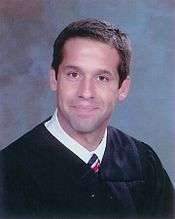Randy Crane
| Randy Crane | |
|---|---|
 | |
| Judge of the United States District Court for the Southern District of Texas | |
|
Assumed office April 21, 2002 | |
| Appointed by | George W. Bush |
| Preceded by | Seat created by 114 Stat. 2762 |
| Personal details | |
| Born |
Robert Randall Crane 1965 (age 50–51) Houston, Texas |
| Alma mater | University of Texas, Austin (B.A., J.D.) |
Randy Crane (born 1965) is an Article III Federal Judge for the United States District Court for the Southern District of Texas. He joined the Court in April 2002 after being nominated by President George W. Bush.
Personal life and education
Born in Houston, Texas, Crane, a Mexican-American, graduated from the University of Texas with his Bachelor's degree in Economics in 1985 and his Juris Doctor degree from the University of Texas School of Law in 1987.[1] He is also a brother of the Sigma Chi fraternity.
Professional career
Crane was a private practice attorney in the State of Texas from 1988 to 2002 at the firm of Atlas and Hall, L.L.P.[1]
Judicial career
Southern District of Texas
On the recommendation of Texas U.S. Senators Kay Bailey Hutchison and Phil Gramm, Crane was nominated to the United States District Court for the Southern District of Texas by President George W. Bush on September 21, 2001 to a new seat created by 114 Stat. 2762, which was approved by Congress. Crane was confirmed by the U.S. Senate on March 18, 2002 on a Senate vote of 91-0 and received commission on March 19, 2002.[2][3] He currently resides in the McAllen division of the Southern District of Texas.
Awards and Associations
Former director of the Texas-Mexico Bar Association
Notable cases
Gulf Cartel
In April 2008, Judge Crane presided over the case of Carlos Landin-Martinez, nicknamed "El Puma," a retired Mexican state police commander who was the number two in command for the notorious Gulf Cartel in Mexico. Landin-Martinez was sentenced to life in prison for federal drug trafficking, money laundering and conspiracy charges.[4] In October 2011, Juan Oscar Garza-Alanis and Josue Ruperto Garza as well as their sister Cantalicia Garza plead guilty to federal drug and money laundering charges. The Garza brothers and sister helped move cocaine from Mexico to the U.S. and the cash revenue from drug sales in the opposite direction for Carlos Landin-Martinez.[5]
Sheriff drug smuggling
Judge Crane presided in the case of former Starr County Sheriff Reymundo “Rey” Guerra who was sentenced by the judge on August 26, 2009, for his role in a drug smuggling plot.[6] The judge sentenced the former sheriff to 56 months in prison for leaking confidential information to known drug smugglers.[6] The judge described Guerra's actions as "a stain on the badge."[6]
Panama Unit
Judge Crane presided over a case involving several lawmen, including the son of the Hidalgo County Sheriff and son of the City of Hidalgo Police Chief. Most of the lawmen were part of the now-defunct Panama Unit which was a narcotics task force composed of several sheriff's deputies and officers from the Mission Police Dept. The task force answered directly to Hidalgo Co. Sheriff Lupe Trevino.[7] Also indicted for the Panama Unit's role in stealing drug loads from drug dealers and selling them to an alleged drug trafficker includes the now former head of the Hidalgo County Sheriff's Department Crime Stoppers, J.P. Flores.[8] The District Attorney for Hidalgo County, Rene Guerra, has said "“Their credibility went from absolute to zero." As a result, he believes he will have to throw out 50-75 cases from state court that relied heavily on the Panama Unit's testimony.[9] Sheriff Trevino has stated that "personally and professionally,” Dec. 12, 2012, the day many of the lawmen were arrested by federal authorities was “my 9/11.” [10] Sheriff Trevino and his number two in command, Commander Jose Padilla were subsequently arrested by HSI.[11]
See also
- 1 2 Judge Crane's Biography from the Federal Judicial Center.
- ↑ "Senate Judiciary Committee" 107th Congress Judicial Nominations, January 26, 2009
- ↑ "THOMAS" Randy Crane USDC, SDTX confirmation: PN1063-107
- ↑
- ↑ http://www.kwtx.com/home/headlines/Siblings_Linked_To_Drug_Ring_Plead_Guilty_In_Texas_130999078.html
- 1 2 3 "The Monitor" Ex-sheriff sentenced to five years for role in drug smuggling plot, August 26, 2009
- ↑ http://www.themonitor.com/news/local/article_918338d8-83bd-11e2-bc90-001a4bcf6878.html
- ↑ http://www.foxnews.com/us/2013/04/05/former-south-texas-sheriff-deputy-facing-drug-charges-enters-not-guilty-plea/
- ↑ http://www.themonitor.com/news/local/article_12a9d34e-c99c-11e2-811e-001a4bcf6878.html
- ↑ http://www.themonitor.com/news/local/article_43eb8cdc-e9c1-11e2-a730-001a4bcf6878.html
- ↑ http://www.justice.gov/usao/txs/1News/Releases/2014%20April/140414%20-%20Trevino.html
External links
| Legal offices | ||
|---|---|---|
| Preceded by new seat |
Judge of the United States District Court for the Southern District of Texas 2002–present |
Incumbent |